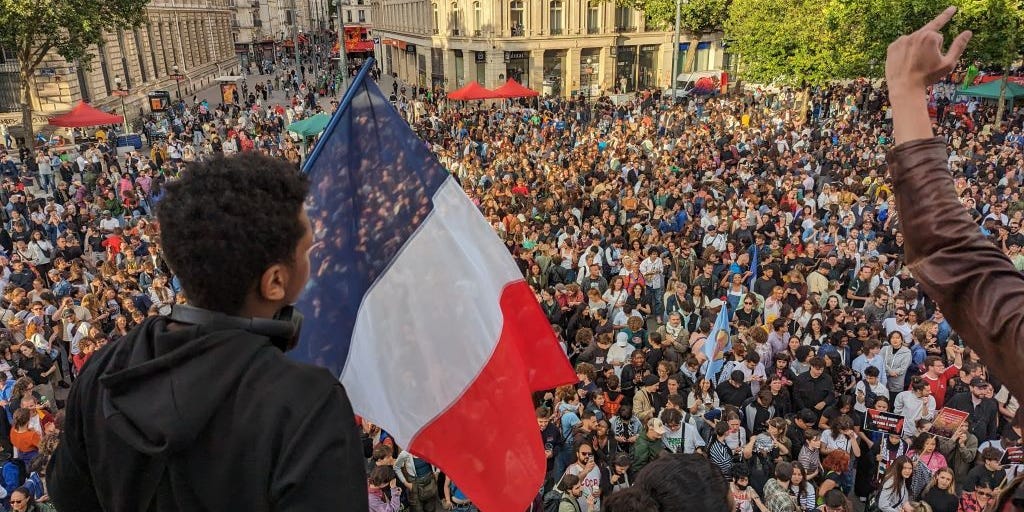Downward angle icon Downward angle icon. Voters dealt a blow to France’s far-right National Rally after the left-wing New Popular Front was projected to take the lead in opinion polls. Luc Auffret/Anadolu via Getty Images President Emmanuel Macron took a big gamble by calling a surprise general election in France. He risked losing what little power he has in the National Assembly to France’s far-right parties. Voters denounced the far-right on Sunday, but no party currently has a majority.
French voters are expected to denounce the country’s far-right, anti-immigration National Rally party but no clear majority emerged on Sunday, further weakening President Emmanuel Macron’s centrist coalition and setting France on the path to political deadlock.
Macron took a big gamble by calling surprise parliamentary elections just after Marine Le Pen’s far-right National Rally party swept the president’s centrist Renaissance party in European Parliament elections in June, winning more than double the number of votes.
The results forced Macron to take a big gamble by dissolving the National Assembly, France’s lower house of parliament, which has the power to pass laws and therefore has the greater influence in parliament, and calling for early elections.
Macron hoped that by doing so, he would establish a stronger mandate in the lower house of parliament and strengthen his influence on the world stage. The president, whose popularity was already declining at home, lost his majority in the National Assembly in 2022, leading his coalition to use a controversial but legal constitutional tool to push through legislation without a vote in the lower house.
The New York Times reported that Macron said his decision was inevitable after he lost his majority in the lower house of parliament and was forced into political maneuvering.
But the gamble backfired.
On June 30, the National Rally party won 33% of the vote in a highly-turnout first round, dealing another major blow to Macron’s Renaissance party and its allies.
The New Popular Front, a left-wing coalition formed for the general election, won 28% of the vote.
Macron’s centrist coalition received just 20% of the vote.
For a moment, it looked like France was on the verge of electing its first far-right government since the Nazi occupation, according to the Associated Press.
But the Times, citing French pollsters, reported that support for the left-wing New Popular Front was growing in the second round of voting on Sunday as the final results drew near, with the party predicted to win the most seats in the 577-seat lower house but fall short of a majority.
The left-wing coalition is expected to secure 177 seats, according to the Times.
Macron’s centrist Ensemble coalition (which includes the Renaissance party) is expected to win second place with 148 seats, while the far-right National Rally is expected to come in third with 142 seats.
Jean-Luc Mélenchon, leader of the left-wing coalition, called the result “a great relief for the majority of our country,” according to the Associated Press.
While the result eased immediate concerns from left and center parties about a far-right government, it could mean France is heading toward political deadlock without a clear majority in the National Assembly.
Final results are expected late Sunday or Monday.



